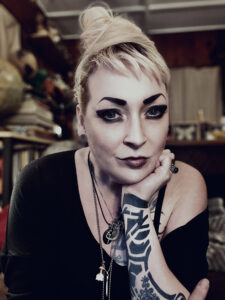
 Donna Lynch is a two-time Bram Stoker Award-nominated dark fiction writer, designer, spoken word artist, and the singer and co-founder—along with her husband, artist and musician Steven Archer—of the dark electro-rock band Ego Likeness (Metropolis Records). Her written works include Isabel Burning, Red Horses, Driving Through the Desert; and the poetry collections In My Mouth, Ladies & Other Vicious Creatures, Daughters of Lilith, Witches, and Choking Back the Devil, among others. She is an active member of the Horror Writers Association, and the winner of the 2019 Ladies of Horror Fiction Awards for Best Poetry Collection—Choking Back the Devil (Raw Dog Screaming Press). She and her husband live in Maryland.
Donna Lynch is a two-time Bram Stoker Award-nominated dark fiction writer, designer, spoken word artist, and the singer and co-founder—along with her husband, artist and musician Steven Archer—of the dark electro-rock band Ego Likeness (Metropolis Records). Her written works include Isabel Burning, Red Horses, Driving Through the Desert; and the poetry collections In My Mouth, Ladies & Other Vicious Creatures, Daughters of Lilith, Witches, and Choking Back the Devil, among others. She is an active member of the Horror Writers Association, and the winner of the 2019 Ladies of Horror Fiction Awards for Best Poetry Collection—Choking Back the Devil (Raw Dog Screaming Press). She and her husband live in Maryland.
What inspired you to start writing?
It feels like I just always did it. I don’t remember not writing. When I was younger I was a painter, but it was frustrating- I could replicate things, but never felt like I could put what was in my head onto the canvas. Writing was my solution to that.
What was it about the horror genre that drew you to it?
Terror. I was an anxious, frightened kid that experienced some trauma, and horror movies were the absolute worst. Even previews on tv wrecked me. But I (accidentally) found out I could read scary stuff and enjoy it. By the time I was a teenager I’d stumbled upon the concept of coexisting with your demons. You create it, you control it.
Do you make a conscious effort to include female characters and themes in your writing and if so, what do you want to portray?
I have made the intentional choice to write male characters, but women are my default setting. There is nothing exceptional about the women I write, they are all sort of extensions of me, so they tend to do things I would do. I have yet to write the “superwoman” archetype. I think it has its place and is important, but so are portrayals of flawed, “regular” women in extraordinary situations. A woman with power can look like many things. You can have a Lt Ellen Ripley or a Wendy Torrance, and both are powerful. There’s not really a shortage of either in the material I watch and read, so I don’t focus too much on how I portray women in my work, aside from making sure I’m not falling into unnecessary tropes. I think it’s okay to see where to story takes you, and reassess the character along the way.
What has writing horror taught you about the world and yourself?
It’s how I come to terms with my own existential crisis. I’m a fan of exposure therapy. This has shown me the lengths which people will go to avoid their fears. I feel like some of us who are immersed in horror tend to run into the darkness rather than away from it. It’s coming for us either way, I’d rather not be exhausted when it gets here.
How have you seen the horror genre change over the years? And how do you think it will continue to evolve?
I like to think it’s getting smarter and more complex. And every day, it’s like we are getting more and more real-life material to draw from.
It’s also nice to see a resurgence of body horror in recent years. What an important and fascinating genre that is. I can really kill a party talking incessantly about body horror.
How do you feel women have been represented thus far in the genre and what hopes do you have for representation in the genre going forward?
I think we are finally branching out from victims and final girls, and I think the fans are starting to believe that us creators have teeth and can bite hard.
Who are some of your favorite female characters in horror?
Shuna Sassi (Nightbreed), Lt Ripley (Alien), Miriam (The Hunger), Dell (Tideland), Thomasin (The VVitch), Theres (Little Star), Fiona (AHS:Coven), The Countess (AHS: Hotel)…I could fill this page, really.
Who are some women who write horror you recommend our audience check out?
The works of Stephanie Wytovich, Gwendolyn Kiste, Lee Murray, Sara Tantlinger, Margaret Killjoy (for dark, dystopian stories), Linda Addison, Marge Simon, Cynthia Pelayo, and Jessica McHugh are all great places to start.
What is one piece of advice you would give horror authors today?
Don’t waste time deciding what you are, or what your specific *thing* is. Just write and let the stories decide. I’ll take it one step simpler: just write.
And to the women who write horror out there who are just getting started, what advice would you give them?
Don’t let people make you believe that women have to end up pitted against one another. There’s an ugly sort of competition that society fosters in women and it’s complete bs. I’m not in competition with any of the women/ femme writers I know. In fact, we help each other all the time. We are each other’s cheerleaders. There’s no one single throne to ascend to, nor a fight for it. We are all queens and royals.

